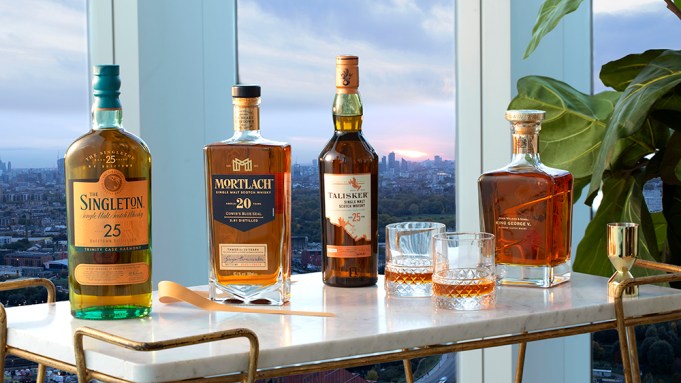The party might be over, or at least morphing into a more sober event as many of the world’s leading drinks companies are reporting declining sales in their spirits divisions. Constellation Brands, Pernod Ricard, and LVMH have all reported a slump in consumer demand for scotch whisky, Cognac, bourbon, and other spirits, a marked reversal from the boom times during the height of the pandemic (as glib as that might sound, sales skyrocketed when people were staying home). Add Diageo, one of the biggest drinks companies in the world, to the list, and some analysts are even going so far as to predict a corporate takeover or acquisition if this trend continues.
Diageo is based in London, but has operations that virtually span the globe. The company is best known for its most high-profile brands, including Guinness, Tanqueray, and the many scotch distilleries that it owns like Lagavulin, Port Ellen, Talisker, and Mortlach. Diageo’s blended scotch brand Johnnie Walker outsells all of those combined by a wide margin, with high-end expressions like Blue Label at the pinnacle of the portfolio all the way down to the lowly Red Label. Here in the U.S., Bulleit and George Dickel are some of Diageo’s American whiskey assets. And in 2017 George Clooney and his partners sold Casamigos to the company for about a billion dollars, now a part of celebrity tequila lore.
According to the drinks business website Just Drinks, the value of Diageo’s stock has fallen over the past year. The reason for this, according to another article that appeared at the website the Spirits Business, is due to a combination of factors: a downturn in business in the Latin American and Caribbean markets, inflation, higher interest rates, and more sober-curious consumers turning from spirits to other low or no-alcohol options (Diageo does own the NA brand Seedlip, it should be noted). Those headwinds led to Russ Mould, the investment director at British firm AJ Bell to write last week about the low stock price: “That bargain valuation, at least relative to Diageo’s history, could make it a takeover target for an opportunistic rival with deep pockets or a private equity firm loaded up with cash to do deals.”
As mentioned before, Diageo isn’t the only company facing tough times. LVMH reported a decrease of 12 percent in wine and spirits sales in the first quarter of 2024 as compared to the previous year, Pernod Ricard noted a slowdown in its Chinese and American markets, and even Brown-Forman, the company behind the whiskey behemoth that is Jack Daniel’s, had an 8 percent loss in its fourth quarter.
That certainly doesn’t mean that Diageo will be sold, and indeed the price might be prohibitive as the company is valued at more than $70 billion. Just Drinks eyes LVMH as the only company that could feasibly afford to acquire Diageo, but quotes an unnamed industry analyst as saying that it’s unlikely that would happen and that it could be carved up into various assets if it were to be sold. The more likely scenario is that Diageo could lighten its load by selling off certain brands or operations over the coming year or two, as it did recently when it sold Guinness Nigeria (the first Guinness brewery to operate outside of Ireland when it opened in 1963).
According to CEO Debra Crow, Diageo will still focus on “premiumization” even though consumers might be looking for cheaper options. “What I would say is consumers are being smart about how they shop,” she said at a January news conference according to Just Drinks. “[But] we believe in premiumization. The U.S. market is a good example of this super-premium-plus price. That’s what’s growing. If you look at premium and below, it’s actually in decline.” That means that the company is not about to get rid of its luxury single malt expressions, like the high-end Rare & Exceptional releases that include Port Ellen Gemini 44-year-old, the Prima & Ultima Collection, and Diageo Special Releases. The hope is that, even during tough times, well-heeled consumers will continue to seek out these luxury offerings.


